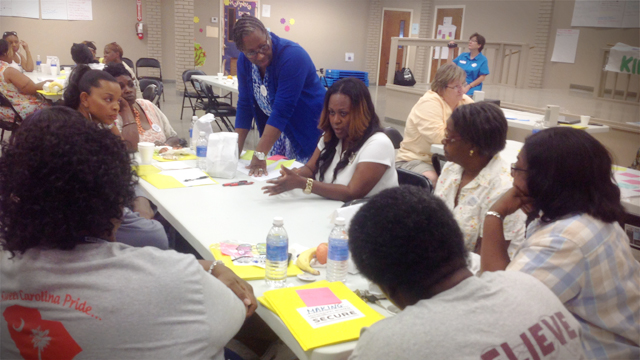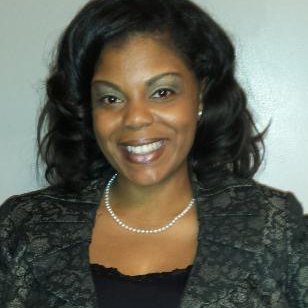Kenisha Potter-Stevenson is an activist working with the Mississippi Women’s Economic Security Initiative to level the playing field for poor women in that state. She shares her own story and the stories of others who are struggling to make ends meet, and the agenda that her group has developed to help these women and their families thrive in this inspiring post.

Women from all backgrounds – educators, judges, lawyers, advocates, activists, social workers, students and struggling moms – from towns in the Mississippi Delta meet at a community center in Indianola, MS, to discuss their most pressing needs. In this breakout session, they explored policy solutions that could meet those needs. (Photo: Carole Cannon/Mississippi Women’s Economic Security Initiative)
When I think of it, I get chill bumps.
I never thought I’d see the day when so many women — of all backgrounds, but mostly women of color — would come together to make Mississippi a better place for ourselves, a better place for our children and a better place for our future.
But that’s what we’re doing right now with the Mississippi Women’s Economic Security Initiative (MWESI) — a movement to push an agenda that was developed the old-fashioned way: by talking to people about the obstacles they face and then addressing the issues they are concerned with. Nine town halls have been held across the state over the past year to give women a chance to speak up about their lives and learn from one another. And what we learned was this: The top priorities for women who are struggling — or who have struggled — in our state, are childcare, education, jobs and wages, health care, and domestic violence and child support.
I hear that MWESI team members are planning to go back to the places where they hosted Town Talks to hold civic workshops to teach us how bills become laws — so that we will understand why it is so important for us to push our legislators. I hear they are also planning to work with their partners to hold legal clinics to help us learn how to better navigate the system, and we have to come out to those workshops by the hundreds. These are the important next steps we must make toward making Mississippi women secure.
I am so thankful to have so many women standing with me as we embark on this journey to make our new agenda a reality in the state where you might least expect it: We have the highest women’s poverty rate in the nation at 23.1 percent; almost 1 in 3 of our children live in poverty, and nearly 65 percent of families in poverty are headed by single mothers. I consider all of the women who have come forward to work on this effort to be my sisters, and that makes me feel safe as we confront the great challenges that lie ahead for us.
I’ve come quite a long way in my own journey — a journey which has led me to become a part of this movement. I haven’t always been a woman who could stand confidently with other women. There was a time in my life when I felt small and unimportant. By the age of 18, I was pretty much a walking billboard for many of the negative stereotypes that are often attached to African-American women. I was a college student — so I was uninsured, unemployed, technically uneducated — and I was pregnant. And while having a child was a life shock to me, for many other naysayers it was exactly what was expected, because my own mom was only 19 years old when she had me. To many policymakers and too many other people, I was just another poor black child, born to another poor black child, bearing another poor black child. I was of absolutely no consequence.
Eventually, I returned to school. But a year after my daughter was born, my Medicaid ended. So I was an uninsured mom, unable to access a lot of the routine health care that I needed in order to be a healthy mother to my child. As a student, I worked nights and weekends. And I struggled. A lot. I worried about my child care. I worried about my child. I worried about my bills. I worried about my own health care. But, eventually, I learned to stand tall again and to hold my head up for my own good and the good of my child. I graduated from college and I now have two degrees in social work.
But I quickly became aware that while education lessened my burden, it didn’t completely alleviate my struggle. For more than 10 years I worked two jobs trying to make ends meet. In our state, 26 percent of black women with college degrees still struggle to make ends meet. This statistic should come as no surprise, since the women of Mississippi make up half of the state’s workforce but hold 72 percent of the minimum wage jobs. And when women do look for opportunities through job training, too often they are steered towards low-wage jobs rather than family-supporting careers.
I know from experience how it feels to be college educated and still struggling. When my employers needed me on nights or weekends, many times I had to take my daughter with me. And I’m grateful for those employers and clients who allowed me to bring my little girl into the room with me, and let her sit in the corner and color or listen to music or put her head down, because they knew that I was struggling and just trying to make it for my child.
Now, as a social worker, I meet women all the time who ask me, “What do I need to do so that I can have safe, affordable, reliable child care for my children?” “How do I find health-care providers who have mom-friendly hours and allow me to come in after hours?” “What do I need to do for my own health-care services — not just for family planning but also my regular health-care needs?” And I have seen too many women, in tears, with their hands trembling, ask me “What do I need to do to make sure that I feel safe from domestic violence or sexual assault?”
To be honest, I didn’t always have the right answers for my clients. I didn’t always know what to tell them.
I can tell them that there are literally thousands of women who are working to make sure that we all have access to health care—90,000 more women would be covered through Medicaid expansion alone. I can say that we are working for family-sustaining wages so that we don’t need government assistance; paid sick and family leave; and funding and technical assistance so that women can pursue non-traditional occupations. I can let folks know that we’re trying to close that wage gap so that we are paid the same money for the same jobs as our male counterparts, instead of 71 cents on the dollar. And I can tell people we’re fighting to make sure that women are protected in the event of sexual assault or domestic violence — 50 percent of sexual assault victims lose their jobs or are forced to quit. We are doing all of this and more — fighting for the economic, physical and emotional security of women in Mississippi, because you can’t separate any of those three things or substitute one for another.
I wish I could tell women it’s going to be easy, but we know it won’t be. There are going to be times when someone may be the only woman in a room, standing up for this agenda, but we won’t waiver. There are going to be times when people will try to divide us or make us feel small, but we will stand firm and hold our sisters tall. There are going to be times when we’re afraid, or just plain tired, but we can’t give up. And we can’t worry too much about how this ends, or where we are right now as we get started. We just need the courage to take a stand, and to fight for the women of Mississippi.


